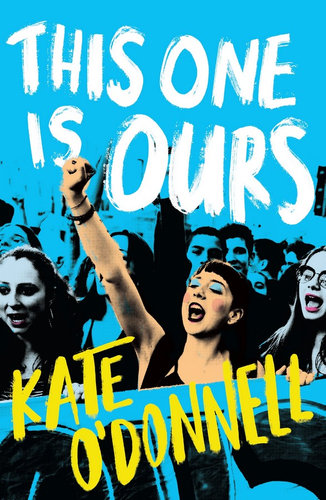Kate O’Donnell, This One is Ours, University of Queensland Press, September 2020, 312 pp., RRP $19.99 (pbk), ISBN 9780702260285
It’s hard to remember it was only last year the world was forced to acknowledge the concerns of young people over the climate crisis. Protests were held in every major city, and not just small-scale wannabes either – these were massive, demonstrative, and long lasting. The future generations carried their hearts on their placards, shouted their anger in their chants, and we all watched, some of us oldies with hope, and some of us with scorn and arrogance. It was a sweeping movement with people like Greta Thunberg at its core. Kate O’Donnell’s latest novel, This One is Ours, captures this moment in time, which has unfortunately been eclipsed by a global pandemic. That is not to say this book lacks relevance, instead it should remind us all that the fight continues.
Sofie’s parents have scrimped and saved to make her exchange program to France possible. She cannot believe she is actually going to the place of Art and Culture, and it means everything to her. Her best friend, Crow is an introverted cynical character, who believes the world is struggling. Sofie’s concerns are much more immediate: She looks for beauty in tiny objects, she goes for long walks, and she dreams, oh, how she dreams.
So, of course her expectations of her five-month stay in Paris are highly anticipated. She longs for romance, to be discovered and revered as an artiste, and believes all the tourist spots will be gasp worthy. Those of us with experience of travel will already know what Sofie’s about to discover – that not everything is as good as it seems from a distance – but these small disappointments don’t deter her from wanting to experience everything.
The narrative flows organically. Sofie is thoughtful and sympathetic. She acknowledges her own unrealistic hopes. Initially dismayed by the constant absence of the daughter of her home stay household, Delphine, rocked by the yellow vest protests, and horrified witnessing the fire at Notre Dame, we watch her overcome her own innocence, her own ignorance, and cheer her on as she discovers her voice through her art, her activism, and her involvement in social justice projects. Sofie is in constant touch with her family and Crow, who become sounding boards for her gradual awareness and reflection of her own privilege.
We also watch her fall in love for the first time. Olivier is charming, attentive and world wise. He is also an art student and while we worry about her heart, we don’t have to worry about her head. She learns much from this relationship and walks away stronger and more in touch with her own emotions. It’s a bittersweet part of the novel that rings true for any 16 year old girl who has been swept off their feet by a handsome fella.
I reread parts of this book before writing this review (mostly because I originally read it back in July), and I fell in love all over again with Sofie’s courage, her sense of self, and her generous, kind spirit. This is a book for now. It will speak to teens who are unable to visit other countries, but who know it’s inevitable they will get there one day. It has many thoughtful and timely insights that will connect and resonate with a weary generation who want more leadership from their politicians and more action for their planet.
Highly recommended.
Reviewed by Trish Buckley


